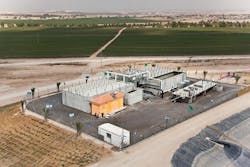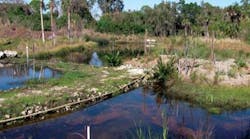Pump Efficiency Gains Help Preserve Energy in Jordan
Outdated pumps at a water facility in Jordan were consuming unnecessary amounts of electricity and poor quality connections led to extensive water losses. With pumping stations accounting for 15% of the nation's total energy demands, a solution was needed. Stefan Girod looks at how a German-Middle East partnership came to the rescue.
Jordan is one of the most arid countries in the world. In the absence of a permanent water supply, water is generally stored in tanks on the roofs of residential buildings. It is the transportation of the water that poses the most challenging problem.
Pumping stations supply millions of people in the nation's cities with water from around 600 springs and wells that are dotted across the country. The pump network has to navigate height differences of up to 1,400 metres.
However, existing pumping stations are outdated, demand extremely high energy consumption and are in desperate need of renovation. They alone account for 15% of the nation's total electrical energy consumption, and because fossil fuels are the primary source of energy generation, they also have a high rate of CO2 emissions. Furthermore, dilapidated supply networks lead to extraordinarily high water losses.
A joint project involving both public and commercial cooperation partners, which is being organised under the leadership of the GIZ or Gesellschaft für internationale Zusammenarbeit (German Society for International Cooperation), intends to set the modernisation process in motion.
Modernisation measures
In 2008, a Public-Private Partnership (PPP) project for sustainable water management started in Jordan (see box out). In the run-up to the project, GIZ carried out multiple energy audits to ascertain the actual energy consumption and energy savings potential of the water supply systems. The results were used as a basis for developing measures and financing concepts. A contracting model between the Jordanian energy provider Engicon and the Jordanian Water Authorities helped to ensure a quick and sustainable reduction in CO2 emissions.
The main focus of the project was to replace an outdated facility with a highly efficient and state-of-the-art pumping station. By doing so, the objective was to significantly reduce the station's energy consumption as well as the extreme energy costs and pollutant emissions associated therewith. In July 2011, a pilot system incorporating electronically-controlled pressure shroud pumps was introduced to the Ebqoriyeh pumping station near to the town of Salt – approximately 20 km west of the capital Amman.
The pumping station provides around 50,000 people with potable water. Each of the new pressure shroud pumps from Wilo can pump 250 cubic metres of water per hour. Overall, the replacement of the pumps has led to a significant increase in the capacity and reliability of the pumping station. A consumption monitoring process carried out by the Performance Management Unit (PMU) of the Jordanian Ministry of Water and Irrigation revealed a 35% improvement in energy efficiency, when compared to the initial condition. Furthermore, estimates suggest around 1,200 tonnes of CO2 can be saved per year through the lower energy consumption of the new pumps.
The pilot project at Ebqoriyeh is by no means intended as a one-off measure. If the energy-saving system solution from Wilo was to be implemented throughout the country, the energy costs for the Jordanian water supply could be reduced by up to one million Jordanian dollars per year. In addition, the impact of CO2 on the climate could be reduced by up to 15,000 tonnes per year by replacing the old pumps in each of the country's pumping stations.
In statistical terms, this equates to the annual quantity generated by 3,750 of the country's inhabitants, according to German firm, destatis. What's more, there are currently hundreds of old pumps of various types still being used to support Jordan's water supply. This makes the overall operation quite difficult as the technicians have to be familiar with different pump types in order to carry out maintenance and repairs. Changing over to a standardised pump type can help to reduce the number of complications as well as the costs.
Project participantsIn collaboration with the GIZ (known as GTZ at the time), the BMU (Federal Environment Ministry) initiated a project with the German pump specialist WILO SE with the aim of improving the energy efficiency (Improvement of Energy Efficiency – IEE) of systems belonging to the Water Authorities of Jordan (WAJ). The GWP (German Water Partnership) assumed responsibility for the coordination of the project. The GIZ conducted field studies on energy consumption and energy savings potential and acted as a local intermediary between the parties involved. WILO SE was responsible for the planning and construction of the new pumping station as well as the switching and control systems. The Federal Ministry for the Environment, Nature Conservation and Nuclear Safety (BMU) funded the project within the framework of the International Climate Initiative. |
And it is not only in Jordan where pump technology plays an important role in the sustainable extraction and supply of potable water. Thanks to the implementation of special materials, energy-saving motors and frequency converters, modern pumps provide considerably more energy efficiency and operational reliability than earlier generations. Frequency converters, for example, enable a pump's delivery rate to be optimally adjusted to varying water volumes. This means that the pumps are always able to operate efficiently, regardless of the changes in volume flow, and their energy consumption remains low as a result. International development work and public private cooperation provide a new and hopeful perspective for a sustainable water supply in Jordan.
In the interim, the major success of the pilot project in Ebqoriyeh has attracted the attention of further investors. The KfW Development Bank and the Japan International Cooperation Agency (JICA), for example, have both expressed an interest in collaborative projects.
For now, the IEE project will run until 2013 and continue to provide technical assistance and consultation to the Jordanian Water Authorities. Further plans for system optimisation can also be made and realised with financial support from both the public and private sectors. The project should serve as a model for other countries as a demonstration that sustainability and efficiency are by no means contradictions in terms. WWi
Author's note:
More Water & WasteWater International Current Issue Articles
More Water & WasteWater International Archives Issue Articles


